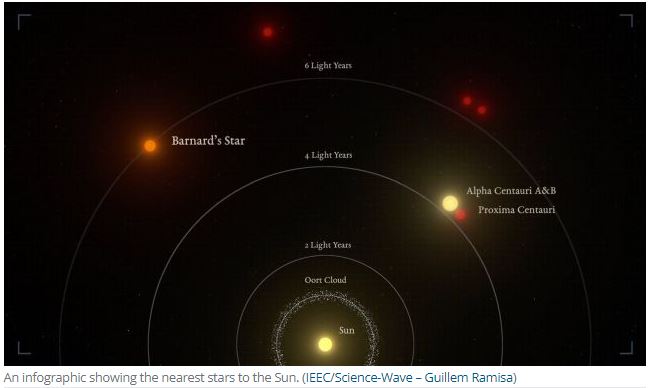Washington DC: In an exciting breakthrough, astronomers have identified a tiny exoplanet orbiting Barnard's Star, the nearest single star to our Solar System, located just 5.96 light-years away. The newfound planet, designated Barnard b, has a minimum mass of 37% that of Earth, making it a fascinating find in the search for smaller worlds beyond our own, reports BBC News. Photo courtesy: BBC News.
Barnard b is not considered habitable, but its discovery is significant as it contributes to the ongoing quest to identify Earth-sized planets in the galaxy. This finding follows hints of a potential planetary signal around Barnard's Star detected back in 2018, which was believed to be a larger planet approximately three times the mass of Earth. However, subsequent observations led to the confirmation of the smaller Barnard b after extensive monitoring of the star.
The red dwarf star, Barnard's Star, is of particular interest to scientists as it offers insights into our galactic neighbourhood. While larger exoplanets are typically easier to detect due to their more substantial gravitational influence on their host stars, Barnard's Star's proximity and its classification as a red dwarf enable researchers to identify smaller planets like Barnard b.
Using the European Southern Observatory's Very Large Telescope, researchers analysed radial velocity signals, which indicate the star's slight movement caused by the gravitational pull of an orbiting planet. Their observations revealed a periodic wobble of 3.15 days, suggesting that Barnard b completes an orbit around its host star in just over three days, at a distance of only 0.02 astronomical units. While this proximity makes it impossible for life as we know it to thrive, the findings point to the possibility of three additional exoplanets in the system, which could be located at more favourable distances.

Astronomers are excited about the potential for further discoveries. "We now need to continue observing this star to confirm the other candidate signals," said Alejandro Suárez Mascareño from the Institute of Astrophysics of the Canary Islands. The research highlights the growing body of evidence that our cosmic neighbourhood is rich in low-mass planets, sparking curiosity about the possibilities that lie beyond our own planet.